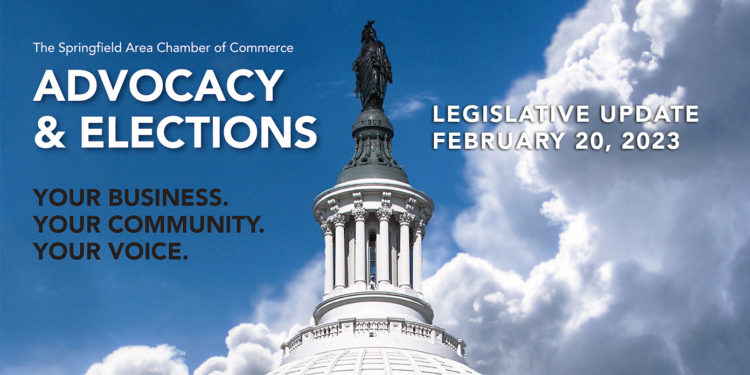Legislative Update: February 20, 2023

We’re monitoring Oregon’s 2023 legislative session for issues of impact and interest to our members. Here’s the latest update from our legislative counsel at the Oregon State Chamber of Commerce (OSCC).
This is an important week for the 2023 legislative session.
First, this is the final week that new legislative bills can be introduced (other than ‘emergency’ or ‘priority’ bills). The deadline to get new bills in the system is Tuesday, and accordingly, we are expecting to see a major tranche of bills introduced this week to add to the 2,347 bills that have already been introduced.
Second, the first major revenue forecast of the session will be unveiled on Wednesday. This is a significant milestone as it will give legislators an indication of whether they will have more or less than the $30.5 billion they are already expecting to be able to budget. As a reminder, the legislature is already in a $560 million “deficit” situation, even with $30.5 billion in anticipated revenues. If the revenue forecast shows a decline in expected revenues, that deficit will grow and will either have the effect of curtailing spending plans or increasing pressure for more revenue.
Finally, the push for the first major bipartisan legislative housing package continues. The housing package will be discussed again on Thursday, and possibly voted out of committee. We anticipate the housing package will go to the Joint Ways and Means Committee for review, and to be matched with funding for early housing initiatives and other potential early session legislative priorities, including a package of incentives for the semiconductor industry.
In meetings over the past week, and now with legislative schedules coming out, it remains to be seen how long the bipartisan collaboration will continue. Some legislative committees appear to be working very constructively together.
Other committees – specifically the House Climate, Energy, and Environment Committee – appears poised to run partisan and ideological bills aimed at speeding up green energy investments and curtailing natural gas infrastructure.
Where we are optimistic
We think there will be a meaningful bipartisan effort to exempt more small businesses from filing for and being subject to the CAT tax. OSCC testified in support of both HB 2433 and SB 127 over the past weeks, and indications are that there will be a serious effort to exempt businesses with up to $5 million in gross revenue from being subject to the CAT. (We do caution, however, that we anticipate the legislature may “pay” for this tax cut by increasing the CAT rate on larger companies).
Where we have concern
Right now, we are very concerned with what we are seeing in the environmental arena – particularly in the House Committee on Climate, Energy and Environment.
Last week we saw two public hearings on bills including HB 2396 – a job-killing bill that would authorize DEQ to create an “indirect source” review program that would regulate projects that promote vehicle traffic or require off-road engines – and HB 3158, which would create a slew of new taxes and fees to fund an incentive program for non-road diesel vehicles. Among other things, the bill puts a new tax on tires and on the purchase and rental of diesel equipment. OSCC opposed HB 2396 and also opposed HB 3158.
As of now, we do not expect HB 3158 to move. The jury is out on HB 2396.
But in the coming weeks, we are going to see additional bills that hurt local communities, in particular HB 3152, which would prohibit the use of funding from gas ratepayers to provide incentives or subsidies for the purchase or installation of gas appliances or devices for use by residential utility customers – including line extension allowances or new gas line extensions that support use of gas in residential buildings. In essence, the ban on natural gas just passed by the Eugene City Council will go statewide.
In other news, OSCC is also concerned with a Board of Forestry decision that would cut nearly 35% of the timber harvest in state forests. This reduction, which is part of the Western Oregon State Forests Habitat Conservation Plan (HCP), could potentially result in the loss of millions of dollars for wood products industry, forestry workers, and the budgets of local governments dependent on revenues from the sale of timber. The devastating impacts on local governments, jobs, and essential services like public safety are of serious concern.
OSCC is aware of SB 795 which would return those state forest lands to counties to be managed by local government for greatest permanent value. A public hearing is expected on SB 795 in the Senate Committee on Natural Resources on Monday, February 27th.
The Springfield Chamber of Commerce will be publishing the OSCC’s legislative updates weekly, or as received. Any opinions expressed or implied are those of OSCC and do not necessarily reflect those of the Springfield Chamber or its representatives. If you’d like more information, please visit our Advocacy & Elections Page.
Discover more from Springfield Bottom Line
Subscribe to get the latest posts sent to your email.






